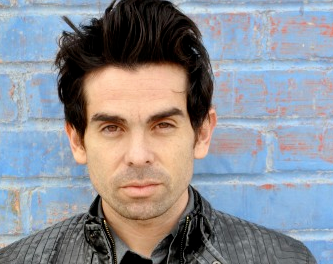
He was a poet, and for the most part his mind was spent scanning and searching for the harmony of words with which he could display the literary symphony his heart was longing to find. He had yet to receive the recognition he felt he deserved; and though having published many works, accompanied readings with distinguished writers, and having a steady flow of commission work, his toil was as of yet: for naught. He had yet to be paid despite all his work.
It was actually exceedingly rare, in his world, for one to receive pay for the work they have done, and many seek and toil after it with great longing. The world, you see, in which this poet lives is not all the same to our own. Differences are often what one glimpses upon the surface, yet if looking deep into the soul, one can find a true sharing of similarity and find much to be the same.
John (though we can't say for sure if that is his true name, for he himself is an orphan like many of the citizens) walked against a chill wind. It seemed winter had lasted all his life. He was surmising about the naked tree branches and his own aching bones, looking for a phrase with which to join the two together in light spirits. "Rot" was the only word that would surface in his mind.
Rounding a corner, John saw a great commotion at the end of a sidewalk. He approached with curiosity, wondering what the cause would be. He saw no car accident. Upon arriving, his eyes met with the scene and his mind, which was often flooding with words, came to a complete stop. He was blank. The poet reached out quickly to grasp a piece of paper that had almost been carried off by the wind. His gaze narrowed from the sights and sounds of the distraught crowd. Naught else but save this scrap of paper held his mind and eyes. He read the few words written on it.
"How horrible!!" he thought. "Why..." His eyes became red and wet until he couldn't see. His tragedy was one of blindness.
Another man, not dissimilar from John, had very much expected to receive pay that year.
Instead, he died.
This man was a fellow citizen like John, but had lived here for far longer, being of a much older age. He most recently had undergone a rare heart transplant, which was in itself and odd occurrence, seeing the man's relative worthlessness at the time.
You see, through the more recent years (of which we know a sizable amount), he was employed in a range of practices. In fact, this man had gone through such a gamut of employments that you might consider him quite wise and knowledgeable, until the discovery that he has never in fact been paid! Wisdom turns to shame and foolishness, knowledge to comedy. This man's tragedy, for most of his life, is one of sorrow.
Our account of this old man must turn back a bit further, though not so far as to make assumptions, for his life was quite longer and darker than we truly have knowledge of. A short span of time will do. We find ourselves, in fact, not far off from his death.
The old man's heart had truly been one of passion, which he poured daily into all he found to do. His nation, even the world, in which he participated, was very encouraging to its citizens to take pride in themselves. He held to this tightly and toiled with much labor in all that he desired to accomplish. "When I receive it, my pay will be enough to find the peace of life I've been working for," he often thought.
He had been working in a common factory for the last several years, and it came about that he would receive a review at work. A thing which is not thought of lightly, for it is indeed quite rare to receive one. For only from a review can a worker receive their pay, and as reviews are rare, payments are even rarer still!
The review took quite a while, but stepping into the hallway from his boss' office, he found it hard to hold back the smile. The paper envelope his boss had given him felt heavy in his hands. The review went well; all of the work he had done was accounted for, much as he had hoped, and even some he did not expect! "Could this be it!" he thought, expecting in his old age to finally have received what he felt he had long since earned.
At his own desk, he searched for his letter opener as the cold wind whistled outside his window. The view, which he often stared out of from his third story office was now not more than a poster on the wall to him. He opened the letter and read the detailed review paper inside. There was a payment information sheet attached!
But soon the letter opener slipped quickly from his hand falling to the floor (as did his jaw). "What?!" he exclaimed. After a great deal of time (and shock), he curiously felt what would be the falling of chains from his shoulders as they hit the floor.
The wind was cold. It blew quite strong on the rooftop. Several hours later, the old man made sure to hold tightly to the papers he now held. One was quite simple, the other he had sealed in an envelope, which he had spent the last hour writing after much thought and contemplation. He was fairly unfamiliar with the particular view now stretching out before him. The city was spread broad in a vast darkness as if disregarding the midday sun. He was uncertain if it should be attributed to his new viewpoint from the rooftop on which he now stood or if his recent, shocking news was to blame.
He shook the thought from his mind. It didn't matter now. He drew in his breath with a smile and closed his eyes. How strange he now felt, how different... what peace he was content to succumb to. The view of the world from his stance was dim, which, with his eyes now closed, he could not see. But it was of no matter for his soul was unexpectedly bright, and he felt as though for the first time: he saw.
Different now.
Wind?... no.... falling.
His feet held to nothing; his hands chilled with the rushing cold air; yet his face still pleasant.
As he found himself falling through the crisp winter air from the rooftop he once stood, he thought about the last line on the detailed paper within his review sheet: "I bid you: come and die." The name written on the paper and the words proceeding these were of great perplexity to which he stared at for a long while: "that you may find life."
Life?
What curious words, what an uncommon request.
His eyes had entered that envelope looking for his due wages, for the toil of his life, for the worth of his work. Instead he found a notice that sung much differently.
Dead on the ground, the old man had quickly attracted a crowd. In his hand, tightly grasped, were the two objects. One of them was a letter to his family (who would later, it turns out, deny receiving it! Theirs, should you wish to learn, was a tragedy of shame). The other object nearly flew away in the wind were it not for a stranger reaching out to grasp it. This stranger, familiar with words and well educated, was our poet, John. He opened the scrap and read what he saw. Scribbled in a ghastly fashion, as if soul and heart both drew the ink and pressed the pen, was shouted on the page:
CHRIST JESUS HAS GARNISHED MY WAGES!!!
"How horrible!!" John thought. "Why.... this dead, old man had no doubt toiled his whole life. And surely HE would not have been paid prior to my own success and accomplishments. No, surely he was expecting his FIRST paycheck; and what tragedy! He thought not to continue on? To try harder... alas even as old as he was. What wretched news... how long and hard he must have toiled. And who is this written here?! I see a name which I can not grasp. This name will not take my wages, for I will try all the harder and in my self shall I find the pay I deserve!"
John walked off, unknowingly with the company of shadows.
The old man's story becomes a little clearer, yet I must say not fully understandable to many. Some of the crowd argue about his death. Some are full of rage at the name written on the paper; others are silent... wanting to know of him more. For who is this who would do such a thing? "How can it be?" many were found whispering. Others argued about whether the old man jumped or was indeed thrown off!! One who claimed the latter was profoundly enthralled with this name written on the page. It is believed that he, in fact, quit his job to find him!
Not much else is known of those people in the following days, for they each went their own way. Some held tighter to their families, others worked longer and harder, some feared the name they saw that day, while others desired to know it more.
The old man's letter to his family was sent and was, as noted before, ultimately rejected. We don't know all of what he wrote, but a part is believed to have called them to leave their jobs, homes, and even family as he did. He spoke of true life, which they called a foolish notion.
The perplexity of the man's life is actually found in his death. For the greatly odd occurrence, with which we introduced him, did not happen during his life but after it. He received a new heart upon his burial. A strange transplant seeing once more the worthlessness of his state. It is rumored that it was his greatest gift (as stated in a portion of his letter to his family). Many who hear of his account cry, "What waste!" or "Tragedy!", but his tragedy had changed. It is no longer one of sorrow.
His burial was quick. Many would ask to be buried with things they found dear to them in life. He found nothing in that world so dear anymore. His passage was one for himself alone, and he carried nothing with him. A small note was found, however, in which he had some last desires...
Upon his casket he asked to have written:
"These doors will not hold,
This dirt can not hide.
What's buried here now
To glory will rise!"
His grave marker was simple, a small piece of rock. It was also quite bare, save his name and the etching of an empty cross. In fact, he shares my name. In that we have much in common:
"Slave of the Lord, Bearer of His Righteousness, Son of the King, Heir to the Glory"
- - -
Christ Jesus garnished my wages. My tragedy is one of joy.
How can it be...
















3 comments:
Hello Talia i am a roommate of andrew and brent and i found this quote on a blog that i read weekly for my class it is by Trevin Wax from his up and coming book. I would love to get your thoughts on it.
“If we proclaim a gospel that focuses only on the private experience of the individual and the heavenly benefits for the next life, then we should not be surprised to see people dismissing the importance of good works in this life within the context of the Church.”
quoted from:Holy Subversion: Allegiance to Christ in an Age of Rivals
Hello Roommate of Andrew and Brent!
Thank you for reading our blog.
Thank you for your question.
I'd like to see Josh respond to that quote... But I'll give it a shot.
I think the quote has a good thought in mind. Trying to get people to be who they are in Christ. Action.
However I believe our way of getting people to do that looks different. I believe the gospel of Jesus Christ and Him crucified is effectual, it's transforming. It focuses on what Christ accomplished that we could never accomplish, and beholding Christ and Him crucified causes change. If one isn't living obediently, it's not a works problem, it's a heart/understanding/embracing of the gospel of Christ's finished work.
A gospel that primarily focuses on Kingdom submission and Kingdom living is a "do"-based gospel (or law-based).
It's like a car with no tires.
Your goal is supposed to get it from point A to point B. Someone suggests "let's put on tires", and the others yell at him and say "Hey this isn't about getting tires on... this is about getting the car from point A to point B, so let's start pushing!"
I look to the book of Romans (chapters 2-5), the book of Galatians, Jesus' ministry (your obedience HAS TO surpass that of the pharisees) He came to "give His life as a ransom for many." The book of Hebrews...
The gospel is "we can't. He did."
I believe that is effectual.
Enjoyed your story David - thanks for the link!
Post a Comment